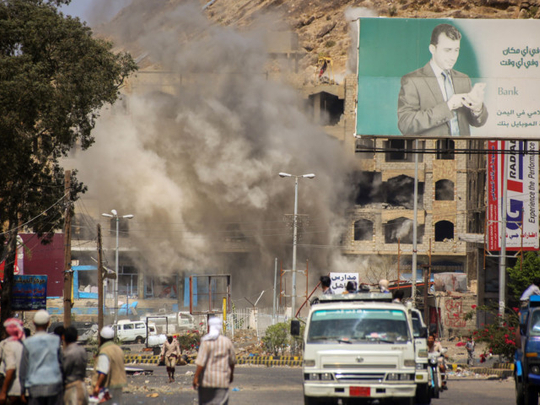
Al Mukalla: After liberating most of Yemen’s Taiz city from Al Houthis, the Iran-backed rebels will no longer use their siege as a negotiating card to pressure the internationally recognised government to bargain with them and it would also give a moral boost to government fighters in other front lines, political analysts in Yemen said on Monday.
Forces loyal to president Abd Rabbo Mansour Hadi on Friday dealt a major blow to the rebels and their allied forces of the ousted president Ali Abdullah Saleh by seizing control of key locations in Taiz, including a lifeline road that links the city with the southern port city of Aden. The government loyalists officially announced ending Al Houthis year-long siege that nearly starved the city.
“The liberation of Taiz and end of the siege have dropped a card from Al Houthis that they used to use to blackmail the government to offer concessions during peace talks,” Abdul Hadi Al Azazi, a political analyst and activist from the city of Taiz, told Gulf News.
During the two rounds of peace talks with the rebels, the government proposed lifting the siege on Taiz and releasing prisoners as trust-building measures to set the stage for successful talks. The rebels refused and stipulated ending air strikes by the Saudi-led coalition. This contributed to collapse of the talks in Geneva in December.
Najeeb Ghallab, a political analyst based in the Saudi capital Riyadh, told Gulf News that the rebels are losing their pressure cards. After suffering military setbacks in the south, Jawf and the province of Sana’a and now the siege of Taiz, Ghallab said, the rebels still have the card of political prisoners to pressure the government to come to negotiation table.
“The end of the siege was a prerequisite for the start of negotiations. Losing the western suburbs [of Taiz] and a border truce [with Saudi Arabia] could lead to meaningful talks. The government should seek a mechanism for the implementation of UN Security Council resolution and building a firm guarantee [for implementing outcomes of peace talks].”
Militarily, analysts said the rebels’ defeats in Taiz would undermine their fighters’ morale and would trigger government forces to intensify attacks on weakened Al Houthis.“ The liberation of Taiz would give a boost to government fighters in the provinces of Ibb, Hodeida Baydha and Marib,” Al Azazi said, adding: “Taiz and Ibb provinces can provide other front lines with a huge number of fighters since their population is almost 5m collectively.”
Many analysts here said that they were not surprised by the sudden collapse of Al Houthis fighters as government forces have acquired military skills after months of intensive training at Al Anad base in the south.
“The victory in Taiz is a natural result of months-long preparations, including training a brigade at Al Anad base,” Abdul Sallam Mohammad, the director of Sana’a based Abad Centre for Strategic Studies told Gulf News. “The militarily professional forces have exhausted the rebels.”












